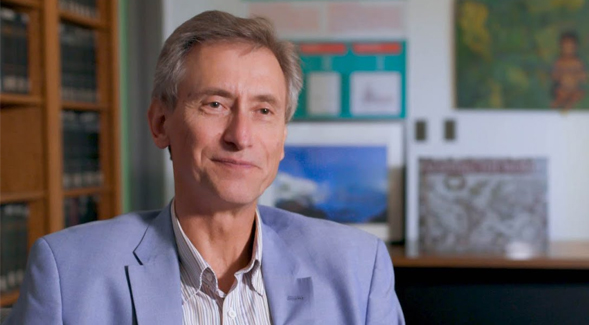SDSU Professor Receives Fulbright to Study Urban City Planning
GIS expert Piotr Jankowski has received a Fulbright Scholar Award to support a research stay in Poland.

“What is so interesting about the work of geographers and GIS scientists like Jankowski is that they merge the advances of technology with the human and social dimensions.”
Everyday people sometimes have access to information too difficult to quickly glean from traditional surveying and structured research—such as when city lights are needed in a specific area, if park equipment is useful, when merging lanes are too short or when bus stops are too sparse.
But it is also often difficult to gather massive amounts of community input as part of the urban planning process, said San Diego State University geographic information system (GIS) expert Piotr Jankowski.
This, he said, is why the town hall structure for gathering community input must be reimagined.
“There is a growing movement and an idea of citizen scientists as valuable auxiliaries of trained scientists, and they are helping to sample traffic noise, count birds, interpret satellite imagery and look for victims of disasters,” said Jankowski, chair of SDSU’s geography department.
“But laypeople are not just participating in the collection and interpretation of data, they are also contributing valuable information.”
Jankowski’s community-driven research has earned him a Fulbright Scholar Award to support a six-month research stay collaborating with other GIS researchers at the University of Poznan in his native Poland.
Jankowski has long been part of an international community of researchers developing tools to create a greater convergence between layman knowledge and GIS research and analysis. Through his international work, he will help develop robust space-time models that inform the planning, development and preservation of public neighborhood and city spaces.
“Jankowski is very devoted to his research and to his students, and he is producing a very impactful research agenda,” said Norma Bouchard, dean of the College of Arts and Letters.
“What is so interesting about the work of geographers and GIS scientists like Jankowski is that they merge the advances of technology with the human and social dimensions,” Bouchard said. “His research advances the way human beings live in urban spaces.”
Jankowski’s Fulbright is the fourth in the College of Arts and Letters in the last two years, in part indicating the strengthening research portfolio at SDSU. Other recent Fulbright recipients in the college include:
- Kathryn Edgerton-Tarpley, a history professor awarded a grant by the U.S. Fulbright Scholar Program to research changes and continuities in Chinese responses to calamity, specifically famine, in the 19th and 20th centuries.
- Huma Ahmed-Ghosh, a women’s studies professor, received a Fulbright award to study the effects of religious tensions on young adults. This fall, she begins a year-long Fulbright Scholar appointment in Delhi and Goa.
- Political science professor Ron King served as a Fulbright senior specialist during the spring of 2018, where he visited Tyumen State University in Siberia to teach a course on social science research methods.
“We have had a couple of wonderful and successful years,” Bouchard said. “These achievements are so important to our college, university and the communities we serve.”
The makings of a digital town hall
For decades, citizen-based knowledge has become more readily used in astronomy, agriculture, archeology, ecology and more recently, GIS.
Beginning in January 2019, while in Poland, Jankowski will examine several large data-driven case studies involving citizens participating in the urban planning domain, assessing the effectiveness of existing and emergent GIS tools the University of Poznan and government agencies are advancing to drastically scale up citizen participation.
Jankowski will evaluate what common citizens deem as quality of life enhancers and also work to identify how citizen knowledge has been influential in decision making, considering political, economic and social dynamics.
“We don’t have a well-defined body of knowledge to understand under what conditions and circumstances that layman knowledge is timely and valuable,” he said. “To help future users, we need to improve the effectiveness of participation.”
Jankowski envisions a future where hundreds of citizens can immediately share details with city planners as they are assessing other analytical data to then shape urban city planning decisions—all without needing to adopt a fixed space and time-constrained town hall structure. Much of that is already happening in some cities in Canada, Europe, and in the United States, he said.
“Almost everyone in our society has at their fingertips the power of a smartphone combined with GPS,” said Jankowski. “People can create their own data, their own information. Is it all good and accurate? Not always. But we are developing techniques and tools that can sweep through that data and obtain good quality data. This enables major changes to democratic forms of decision making.”



